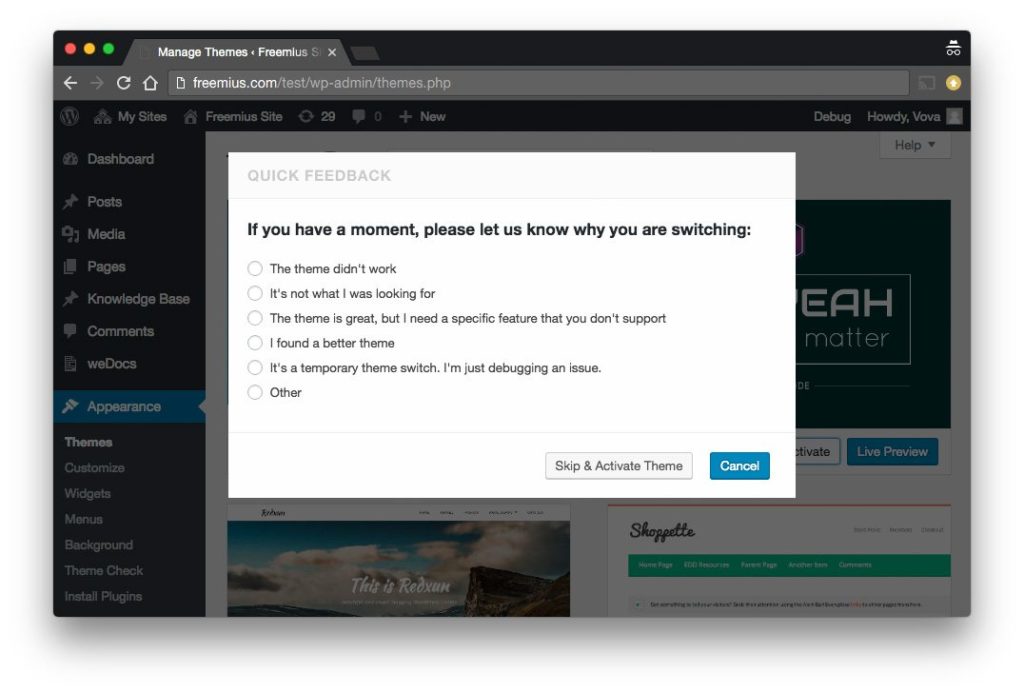Data is constantly being collected. Whether it’s through your email account, social media, or an online store. Companies are watching how users interact with their websites to improve their digital experience.
However, collecting and using data isn’t something the WordPress community does. Vova Feldman, CEO and Founder of Freemius, is working to make data a bigger priority for developers with the company’s newest product, Freemius Insights.
Freemius Insights aims to provide theme developers with data they may not have had access to in the past. See how many active sites are using your theme, how many have deactivated and how many uninstalled. You can even see which version of PHP the user is operating on.
All of this is good to know, but one of the most useful data streams comes when someone uninstalls the product. They will be prompted to choose a reason for uninstalling. This can point to flaws with the theme itself, something you can’t tell from the data on the WordPress dashboard.
According to Feldman, right now a lot of WordPress development is blind. You make your product, put it on the repository, and get some feedback, but not enough. You don’t know why people are uninstalling, or if there are features users are loving that could even become a stand alone plugin or theme. There is a ton of data automatically being collected, but many developers aren’t utilizing it.
“There is no normal company in the world that isn’t checking data, WP is the only ecosystem that doesn’t have that,” Feldman said.
WordPress and Data
Why aren’t developers using more data to inform plugin and theme changes? Feldman has a few theories.
The first of which being a misconception of what data should and shouldn’t be used.
“If you go to the .org guidelines there is a section called ‘no phoning home’ that says you can’t send any data to third parties. It should all stay in website. It says you can if you have exclusive consent of user,” Feldman said.
People may be worried about violating the guidelines and are avoiding accessing that data altogether. However, according to Feldman, the fine print states that if you ask users before they download the plugin, you can use that data. That’s why companies like Akismet and now Feldman’s product Freemius Insights., has a prompt before download where the user can decide how much information the plugin or theme can gather.
This practice is within the bounds of the guidelines, but people may not be aware.
Of course, privacy is always a huge concern on the Internet. Companies like Google collect data when you do anything. The user doesn’t know if that is being used to create targeted ads or help make the user experience better. That can be disconcerting. However, if you explain to the user exactly what you’ll be accessing and why most people are willing to opt in.
In Feldman’s experience, 60 percent of users opt into sharing data. That’s a lot of people offering to help improve the user experience of your product.
User Experience
As a developer, it’s easy to assume your users know how to operate your theme or plugin. Of course, if you’re versed in WordPress, set up steps are easy. But if you’re downloading your first theme, you may not know where to start. Your plugin or theme might be difficult to use, and unless the user is contacting you directly, you may have no idea.
The form provided by Freemius Insights when a user uninstalls can help point out these potential holes. If your theme is translated into five languages but your biggest user base speaks something else, you may be missing out on that entire population. Get the feedback, add the translation and you could increase your user numbers quickly and easily.
“The whole ecosystem will produce better products. Will be great for users and developers alike,” Feldman said.
The more you can learn about how people are using your theme, the more tools you’ll have to improve it. Using data is a great way to improve the way you look at your site.
You can start using Freemius Insights for free for now, and the price increases depending on how many active installs you have.
Want to learn more about data and development? Make sure you check out the webinar on Data-Driven Theme and Plugin Development with Feldman, March 22 at 11:00 am CST.


No Comments